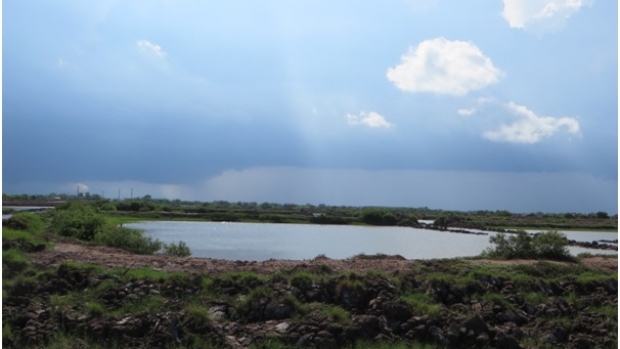Grants :: Small Grant Facilities :: Converting failed intensive shrimp farms to mangrove poly-culture systems to build ecosystem resilience to climate change at Thanh Hai commune, Thanh Phu district.
Converting failed intensive shrimp farms to mangrove poly-culture systems to build ecosystem resilience to climate change at Thanh Hai commune, Thanh Phu district.

Shrimp pond in Thanh Hai Commune, Thanh Hai Commune, Thanh Phu District, Ben Tre Province © IUCN Viet Nam
Objectives
The project aims to restore the productivity of failed intensive shrimp farming land in Thanh Hai commune, Thanh Phu district, Ben Tre province, by converting them to mangrove polyculture systems to build ecosystem resilience to climate change.
Background
In recent years, due to high economic values from industrial shrimp farming, many entrepreneurs have rented mangrove land from locals to build shrimp ponds in Thanh Hai commune, Thanh Phu district of Ben Tre province. This process rapidly degrades the land as mangrove forests are cleared and high amount of chemicals are applied to the land. These lands become too poor to farm after the renting time and are usually abandoned when returned to local households.
Target beneficiaries
- 05 households will directly participate in models and trained on soil preparing and forest planting
- 90 people in neighbouring area participate in dissemination workshops
- Knowledge transferred to wider community.
Outputs
- 03 ha of failed shrimp pond is successfully converted to mangrove poly-culture and produces income for households
- 30 radio broadcasts on knowledge of mangrove poly-culture conversion from failed shrimp land
- Two technical training courses on silviculture and aquaculture
Accomplishments and challenges
People are more aware of land use and mangrove protection and development, contributing to climate change adaptation. The project has built a model with an area of 3 hectares, in which over 2 hectares of mangroves (Rhizophora apiculata) have been planted, more than 500 kg of aquaculture products of all kinds have been harvested (253 kg of shrimp, 100 kg of crabs, 80 kg of brown and 72 kg of Pseudapocryptes elongatus - mudskipper). Results of aquaculture from the project model will improve economic life for local people, contributing to the new rural development in the future.
The project which has been successfully implemented has had a huge impact on the households participating in the project in particular and the community in general. Local people have understood that there is a need for land restoration after industrial shrimp farming for combined forest planting and aquaculture for the effectiveness and sustainability. Under the Project, mangroves were restored for more efficient aquaculture to avoid "desertification" of lands after industrial shrimp farming; at the same time, the planting would contribute to increasing forest coverage, biological diversity of mangroves in the region for better response climate change.
The project has created good conditions for local women to be involved in, through activities such as contributing comments on the project at meetings, trainings and workshops; signing contracts for implementation of the activities: applying organic fertilizers to the soil, collecting Rhizophora propagules, forest planting in the model of the project. Women of households participating in the project and project staff have been involved in monitoring and managing the project. Such activities have enhanced the role and responsibilities of women in the community.
It can be seen from the project activities implemented that beneficiaries are households; aquaculture and forest protection consciousness of the people has been raised; as a result, local authorities fully support and wish to achieve more MCC/MFF projects to be undertaken in the localities.
MFF believes that after the project ends, the results above will be applied by local people. This can be achieved by the fact that the Project Management Board will technically assist project households to maintain the caring, protection of the planted forests in combination with aquaculture in the built model, provide consultations for the community on restoration and construction of the above farming model; project households agree to maintain the project model that has been built; the local authorities have highly appraised the results of the project.
Contributions to cross-cutting themes
- Environmental protection
- Climate change adaptation
Lessons Learned
Project activities should both fit the criteria set by MCC/MFF and meet the requirements of the Department of Planning and Investment of Ben Tre province; if so, they will be easily approved and coordinated by the Provincial People’s Committee.
Selected households need to meet the criteria of the project such as: households with industrial farming ponds that suffer from failure but without sufficient budget and techniques for restoration; these are households that agree to implement project activities as planned and voluntarily participate in the project.
Project Facts
Country
Location
Thanh Hai Commune, Thanh Phu District, Ben Tre Province
Topic
Duration
1st Jun 2014 to 30th May 2015
MFF Grant Amount
362,820,000VND
Implementing Partner
BEN TRE FOREST MANAGEMENT BOARD.
Representatives Contact: Nguyen Thanh Lap
Address: Thanh Thoi Dong Hamlet, Thanh Hai Commune, Thanh Phu District, Ben Tre Province
Telephone: 0753 886 036